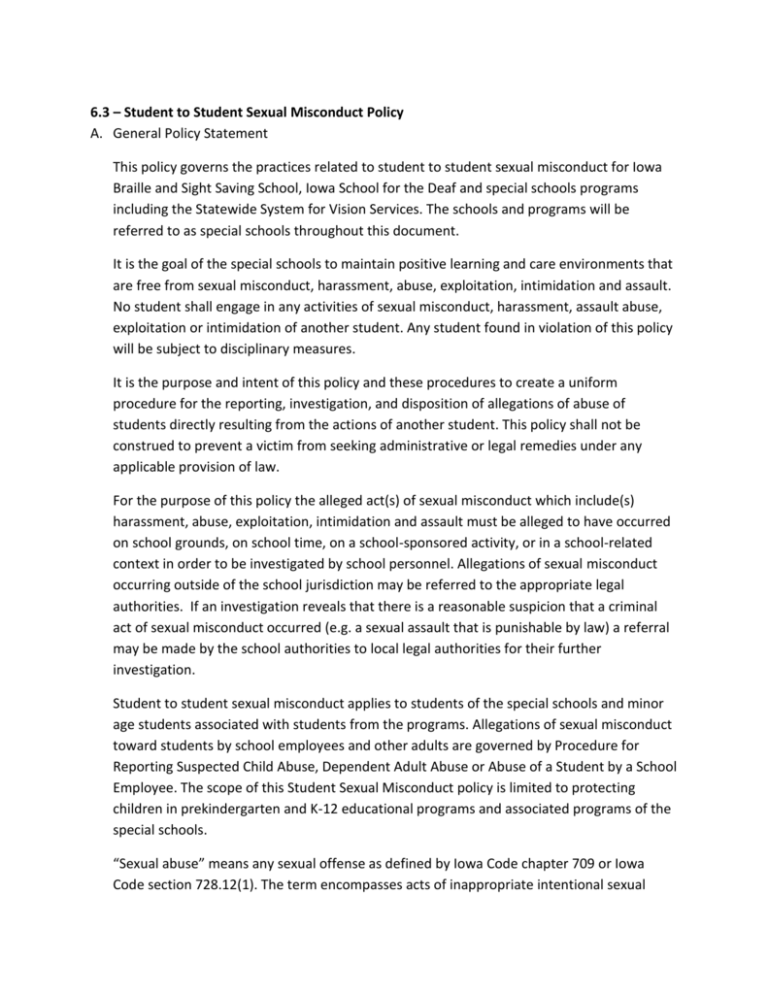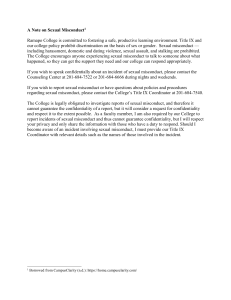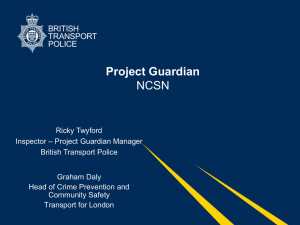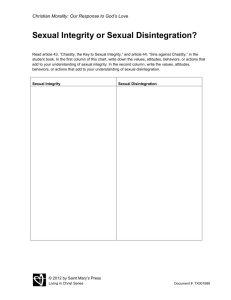
6.3 – Student to Student Sexual Misconduct Policy
A. General Policy Statement
This policy governs the practices related to student to student sexual misconduct for Iowa
Braille and Sight Saving School, Iowa School for the Deaf and special schools programs
including the Statewide System for Vision Services. The schools and programs will be
referred to as special schools throughout this document.
It is the goal of the special schools to maintain positive learning and care environments that
are free from sexual misconduct, harassment, abuse, exploitation, intimidation and assault.
No student shall engage in any activities of sexual misconduct, harassment, assault abuse,
exploitation or intimidation of another student. Any student found in violation of this policy
will be subject to disciplinary measures.
It is the purpose and intent of this policy and these procedures to create a uniform
procedure for the reporting, investigation, and disposition of allegations of abuse of
students directly resulting from the actions of another student. This policy shall not be
construed to prevent a victim from seeking administrative or legal remedies under any
applicable provision of law.
For the purpose of this policy the alleged act(s) of sexual misconduct which include(s)
harassment, abuse, exploitation, intimidation and assault must be alleged to have occurred
on school grounds, on school time, on a school-sponsored activity, or in a school-related
context in order to be investigated by school personnel. Allegations of sexual misconduct
occurring outside of the school jurisdiction may be referred to the appropriate legal
authorities. If an investigation reveals that there is a reasonable suspicion that a criminal
act of sexual misconduct occurred (e.g. a sexual assault that is punishable by law) a referral
may be made by the school authorities to local legal authorities for their further
investigation.
Student to student sexual misconduct applies to students of the special schools and minor
age students associated with students from the programs. Allegations of sexual misconduct
toward students by school employees and other adults are governed by Procedure for
Reporting Suspected Child Abuse, Dependent Adult Abuse or Abuse of a Student by a School
Employee. The scope of this Student Sexual Misconduct policy is limited to protecting
children in prekindergarten and K-12 educational programs and associated programs of the
special schools.
“Sexual abuse” means any sexual offense as defined by Iowa Code chapter 709 or Iowa
Code section 728.12(1). The term encompasses acts of inappropriate intentional sexual
behavior by another student toward a student. Student to student acts of sexual
harassment are also governed by policy on Initiations, Hazing, Bullying or Harassment and
the accompanying procedure.
Sexual activity with a minor or between minors, even if consensual, may be determined to
be sexual assault or sexual misconduct. Sexual assault may have occurred if one of the
parties used physical force to make the other have sexual contact with him/her. Sexual
assault may have occurred if one threatened the other to have sexual contact with him/her.
Although these actions are not all inclusive, these are actions that when alleged will lead to
investigation. The requirements of this policy are not discriminatory regardless of race,
color, national origin, religion, sex, sexual orientation, gender identity, age, marital status or
disability.
The special schools prohibits retaliatory action against any person filing a complaint of
student to student sexual misconduct or against any person cooperating in the investigation
of any charge of student to student sexual misconduct. This includes any form of
intimidation, threats or harassment. The special schools prohibit an individual from
knowingly filing false charges of student to student sexual misconduct. Acts of retaliation
and of knowingly filing false charges of student to student sexual misconduct constitute
violations of the Student Code, of the Employee Handbook and of this policy and will result
in disciplinary action.
Through the investigation process the special schools personnel will make all reasonable
efforts to protect the confidentiality of the alleged victim and the alleged violator. The
special school’s ability to protect the confidentiality of the involved students will be
determined by the degree of threat or of a clear and present danger to the victim or other
members of the special school community posed by the accused. To the greatest extent
possible, based on an analysis of safety risk, special schools shall adhere to the
confidentiality requirements set forth through the Individuals with Disabilities Act and the
Family Educational Rights and privacy Act (FERPA).
The Superintendent’s office including the Superintendent or designee, the Regional Director
or the Director of Student Life, will coordinate all student to student sexual misconduct
allegation actions including coordination of contact information, communication,
investigation and reporting.
B. Support for the Alleged Victim
Of primary concern is the support for the alleged victim of the sexual offense. When an
offense is learned of or reported the student victim’s parent or guardian will be contacted
immediately. The alleged victim and parent(s) will be offered the support and assistance of
a trained sexual assault advocate. The parents of the victim will be encouraged to report to
law enforcement and will be informed of procedures for initiating civil action. The victim
and parent(s) will be provided physical and emotional support through a trained advocate.
The alleged victim and parent will be informed of victim rights which include:
1. Information on reporting to law enforcement that clearly informs the victim and
parent(s) of this option, if the offense had not yet been reported by school personnel;
2. An opportunity for the parent and student, when appropriate and at the parent
discretion, to participate in campus disciplinary hearings;
3. The right of the parent and student to be accompanied by an advisor during the
investigation and hearing;
4. The right of the parent or student victim to provide a victim’s impact statement if the
accused is found in violation; and
5. To the extent allowed by confidentiality laws governing special education, the right of
the parent and student victim to know the outcome of the hearing, including
determination and sanction imposed.
It is critical to the investigation process that incidents of student to student sexual
misconduct be reported immediately and certainly within twenty four hours of the incident.
Recipients of the report must report immediately to the Superintendent. Reports beyond
that time frame will be investigated but the ability to determine what may have occurred
will be compromised by the passage of time.
C. Safety of Alleged Victim During Investigation
The following options are available to ensure the safety of a student who might be in
imminent danger of continued contact during the investigation process:
1. Temporary removal of the alleged student victim from contact with the other student.
2. Temporary removal of the alleged student violator from service
3. The accused student may be restricted in activity until it has been determined if a
reportable offense has occurred. If a reportable offense has occurred, the student may
be recommended for change of IEP or placement review.
4. If the accused individual is not another campus based student, the individual's presence
on campus will be excluded by means of legal enforcement. A permanent exclusion
from campus will be in effect if the accused is found guilty.
5. Any other appropriate action permissible under Iowa and special education law to
ensure the student's safety.
D. Initial Duties of Investigator – Student to Student Sexual Misconduct Allegations
1. Upon receipt of the report, the investigator shall make and provide a copy of the report
to the person filing and to the student's parent or guardian if different from the person
filing.
2. Upon receipt of a report of sexual misconduct or other notice of an allegation of sexual
misconduct, the investigator shall review the facts alleged to determine that the
allegations, if true, support the exercise of jurisdiction.
3. The investigator shall notify the parent, guardian, or legal custodian of a child, in prekindergarten through grade six, of the date and time of the interview and of the right to
be present or to see and hear the interview or send a representative in the parent's
place. The investigator shall interview the alleged victim as soon as possible, but in no
case later than five days from the receipt of a report or notice of the allegation of sexual
abuse. The investigator may record the interview electronically. The investigator shall
exercise prudent discretion in the investigative process to preserve the privacy interests
of the individuals involved. To the maximum extent possible, the investigator shall
maintain the confidentiality of the report.
E. Role of Investigator
The designated investigator's role is not to determine the guilt or innocence. The
designated investigator shall determine, by a preponderance of the evidence, and based
upon the investigator's training and experience and the credibility of the student, whether it
is likely that an incident took place.
If, in the investigator's opinion, it is likely that an incident in the nature of a criminal sexual
act occurred, the investigator shall temporarily defer further investigation and shall
immediately contact appropriate law enforcement officials, notifying the student's parent
or guardian and the person filing the report, if different from the student's parent or
guardian, of the action taken.
If, in the investigator's opinion, an incident occurred that would not constitute a criminal
sexual act but that was in the nature of inappropriate, intentional sexual behavior by the
student, toward a student, further investigation is warranted. Prior to interviewing any
collateral sources who may have knowledge of the circumstance contained in the report the
investigator shall provide notice of the impending interview of student witnesses who are in
prekindergarten through grade six, to their parent, guardian, or legal custodian, and may
provide notice to the parent or guardian of older students, prior to interviewing those
students.
If, in the investigator's opinion, the allegation of sexual misconduct is unfounded either
because the conduct did not occur or the conduct did not meet the definition of misconduct
in these rules, further investigation is not warranted. The investigator shall notify the
student's parent or guardian, the person filing the report, if different from the student's
parent or guardian, and the parent(s) of the other student named in the report of this
conclusion in a written investigative report to the extent permitted by the Family
Educational Rights and Privacy Act (FERPA) and the Individuals with Disabilities Education
Act (IDEA).
Within 15 calendar days of receipt of the report or notice of alleged sexual misconduct, the
designated investigator shall complete a written investigative report.
The written investigative report shall include:
1. The name, age, addresses, and attendance center of the alleged student victim named
in the report
2. The name and address of the student's parent or guardian and the name and address of
the person filing the report, if different from the student's parent or guardian
3. The name and address of the student named in the report as allegedly responsible for
the misconduct of the student
4. An identification of the nature, extent, and cause, if known, of any injuries or abuse to
the student named in the report
5. A general review of the investigation
6. Any actions taken for the protection and safety of the student
7. A statement that, in the investigator's opinion, the allegations in the report are either:
a) Unfounded. (It is not likely that an incident, as defined in these policies and
procedures, took place) or
b) Founded. (It is likely that an incident took place.)
8. The disposition or current status of the investigation
9. A listing of the options available to the parents or guardian of the student to pursue the
allegations. These options include, but are not limited to:
a) Contacting law enforcement
b) Contacting private counsel for the purpose of filing a civil suit or complaint
The investigator shall retain the original copy of the investigative report. The person filing
the report, the parent(s) or guardian(s) of the student named as the victim in the report and
the parent(s) or guardian(s) of the named student shall be notified that the investigation
has been concluded and of the disposition or anticipated disposition of the case to the
extent permitted by the Family Educational Rights and Privacy Act (FERPA) and the
Individuals with Disabilities Education Act (IDEA).
F. Training for Investigators
Annual in-service training will be provided for the designated investigator and the
alternate(s).
G. Training for Employees
Annual in-service of Chapter 102 reporting of abuse of student(s) by school employee(s),
student to student sexual misconduct policy, anti-bullying harassment policy and
mandatory reporting of child abuse to the Department of Human Services will be provided
to all special school employees.
Related Regents Policies
4.30 Policies on Harassment
6.30 Abuse Policy at the Special Schools
6.32 Student Wellness Policy for the Special Schools
6.33 Anti-Bullying/Harassment at the Special Schools
6.34 Illegal Items at the Special Schools or in a Student's Possession <
Approved by the Board of Regents 12/10/08
Revised 08/2013







